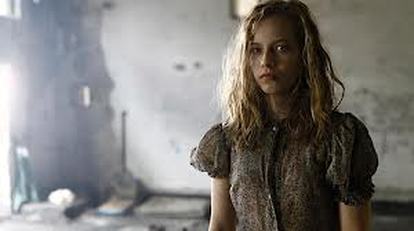Dir. Cate Shortland
So here's the deal: you fight a just war, overcome tyranny then rub your hands and congratulate yourself on a job well done. You can assert your moral superiority and claim to have created a new world order. There's a familiar ring to all of this, isn't there?
If only history worked in such straight lines; if only hearts and minds were so pliable. This film amply demonstrates that if war is hell, then so is the aftermath. The Second World War is generally depicted as the good guys versus the evil Nazis with a convenient overlooking of the Allied partnership with Stalinist Russia, a blind eye turned to the Dresden atrocity etc. It's an ambivalence which surrounds the eponymous Lore as she takes on a matriarchal role with regard to her four younger siblings attempting to deliver them safely to their grandmother in Hamburg; a nightmare five hundred mile journey through post-war Germany.
As with most picaresque tales the greater journey takes place in the head. Lore begins the film showing the influence of her Nazi parents, "The final victory will soon be here," she says to her mother whose return look is more eloquent than any line of dialogue could be. The Nazi brainwashing can not be easily dismissed. A woman in a deserted house weeps before a picture of Hitler and says, "He loved us." Passengers on a train discuss photos of the holocaust and dismiss them as "American lies." Even when the children reach their grandmother's house she urges them to be proud of who they are and stresses that their parents "did nothing wrong."
But Lore's conviction is shaken by having witnessed the residual waste of war: the rape victims and the suicides. She has seen for herself how the children are rejected by country folk who now do not want to associate with them or what they stood for. Guilt by association or generational endowment. "The fathers have eaten sour grapes and the children's teeth are set on edge" complains Jeremiah in the Old Testament. But this more than a legacy innocently picked up by the younger generation. Lore has seen the holocaust pictures and has made a link with her father's role in the war. Add to that the fact that the children are being helped by a Jewish boy refugee from the camps and the moral picture is muddied. Muddied even further when they kill an eel fisherman for his boat after luring him with sex. Then it turns out that Thomas, the boy, is not Jewish after all; he is travelling using stolen papers. What horrors and crimes is he hiding about his past? Who are the good guys, if not the young kids?
This is a compelling but disturbing film. Cate Shortland's direction takes us right up to the whole sorry mess where we can almost smell the stench and feel the filth of squalor. How tantalising then, the bathing in the river scenes, the sharing of baths. The exterior shots too demonstrate the ironic beauty of rural Germany. Cleanliness and moral rectitude are surely within reach.

 RSS Feed
RSS Feed
